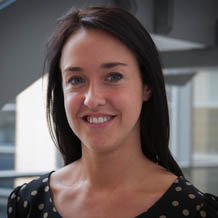Dr Katie Smith
Senior Lecturer (Teaching & Scholarship)
Teaching and scholarship
![]()
I teach on range of modules across all levels covering topics including anatomy, physiology and metabolism. I use a variety of teaching methods with the view to not only increase understanding, but also improve student confidence, analytical skills and critical evaluation. I enjoy teaching physiology in interactive practical classes. Practical sessions are a fun and engaging way to teach physiology and reinforce the theoretical concepts taught in lectures. They also help students develop transferable and employability skills such as teamwork, leadership and communication.
![]()
I give lectures on topics such as muscle physiology, placental development and ATP production. To maximise student accessibility and interaction, my lectures are always supported by online material such as revision notes, online quiz questions and lecture recordings. Lectures are no longer a place for passive knowledge transfer from lecturer to student. Instead, my lectures aim to inspire students to think for themselves, to question current scientific theories, and leave the lecture theatre with the passion and drive to learn more about the subject independently.
![]()
The final year research projects that I offer are typically aligned to my interests in health and obesity and usually involve students generating surveys to gather data on public health and behaviour. Worldwide, obesity now kills more people than starvation. Approximately 60% of adults in the UK are classified as overweight or obese which greatly increases the risk of developing a number of health conditions. The cause of obesity is multifactorial but clearly lifestyle plays a role. Health surveys allow patterns of behaviours linked to being overweight or obese to be studied which might provide an insight into the cause of the growing obesity epidemic. I also offer science communication projects, which are mainly student-led, based on their own interests and career aspirations.
Other scholarship
Within the department of Biology, I am the Associate Director for Students, which means I have an increased pastoral role and a responsibility for student welfare and progression. This role also fits with scholarship and pedagogical research interests on student transition (into and through university) and improving student support and well-being. In particular, with a team of stage coordinators, we closely monitor student feedback and aim to build student well-being into our programme design. I enjoy working with students on projects and have recently recruited student interns to help redesign our transition support material.

